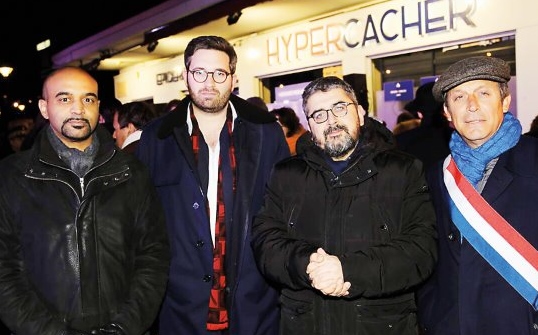
World

Anti-Semitism among Yellow Vest protesters demoralises France’s Jews
CNAAN LIPHSHIZ
The Republican March, as it is known, took place on 11 January 2015 amid national mourning after Islamists gunned down 12 people at the Charlie Hebdo satirical magazine and, two days later, four people at a HyperCacher kosher store. The silent protesters held signs reading ”I am Charlie”, “I am police”, and “I am Jewish”.
That march was “something we have never seen before in France and perhaps anywhere”, Levy, a Jewish philosopher and celebrated author, said at the time. “It’s a kind of miracle, this national unity, this feeling of fraternity, this willingness by Parisians to go down to the street.”
Four years on, he had hoped it would be a watershed moment for French society, he told JTA on Wednesday.
Change “alas did not come”, and the march’s “spirit and promise have been betrayed” by another wave of street protesters, he said, namely the Yellow Vests movement. What started out in the northern hemisphere autumn as a series of protests against a hike on fuel prices has been mired since in countless instances of violence against police and a substantial amount of anti-Semitic hate speech.
“Instead of a million people in the street, today we have thousands of homophobes, xenophobes who are anti-republican, anti-journalists, and sometimes anti-Semites. For these demonstrators, it’s as if the bloodbaths never happened,” said Levy, who is scheduled to speak on 13 February at the 92Y Jewish community centre in New York about these and other issues.
Anti-Semitic incidents during protests by Yellow Vests – named for the reflective safety vests they wear – have included signs and slogans describing French President Emmanuel Macron as a “whore of the Jews” and their “puppet”.
There have been many cases of protesters performing the quasi-Nazi quenelle salute, which was created by the French comic Dieudonne M’bala. Dieudonne, a Holocaust denier who has been convicted of hate speech against Jews and others, now delivers his weekly hate sermons online on video platforms while wearing a yellow vest.
These cases, as well as anti-Semitic graffiti and chants, are on the “margins” of the Yellow Vests movement, according to the National Bureau for Vigilance Against Anti-Semitism. But nonetheless, they have been a feature of that movement since its inception, the bureau’s founder, Sammy Ghozlan, told JTA.
Violence against police, meanwhile, seems to have become a hallmark of Yellow Vests protests – even if only a minority of participants engage in it. Hundreds of police officers have been wounded in confrontations with Yellow Vests. Nearly 50 of them were injured on 1 December alone.
That Saturday, multiple cars were set ablaze in Paris’ chic Champs Elysees shopping area. On 11 December, several police officers were wounded in confrontations that turned whole streets of the capital into war zones shrouded in smoke from burning plastic and tear gas. Some protesters flung yellow paint on police, causing eye injuries. In response, police used water cannons, injuring many dozens.
Attacks on police are particularly troubling to many French Jews, who for the past 15 years have depended on security forces for the protection of their schools, neighbourhoods and synagogues.
But the emergence of anti-Semitism as a characteristic of the protests is more terrifying.




